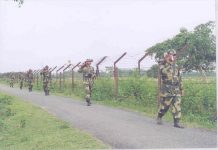
By C. Uday Bhaskar
Director, Society for Policy Studies
India is in a state of shock and disbelief over a video clip which shows two women being paraded naked and molested by their tormentors in Manipur.
The women were later gangraped and their two male relatives killed by a group of men in a barbaric display of tribal hostilities. The gory incident occurred on May 4 in the early phase of the ethno-religious violence that rocked the state, and it has now scorched the collective consciousness of the country.
Predictably, reports of similar cases of rape and murder have surfaced and it is likely that other horrific acts of killing and mutilation will emerge from the destruction and depravity that have engulfed Manipur.
Women being subjected to sexual violence during conflicts and wars has a hoary past. While this deplorable practice deserves condemnation and cannot be condoned in any manner by a modern democratic state, sadly, it still occurs in contemporary conflicts. Post-Cold War regional conflicts and recent local wars in Africa are illustrative.
In the Indian context, the 2012 Nirbhaya episode jolted the nation’s conscience for the extreme brutalisation of the hapless victim, but it was seen as an isolated case of diabolical criminality. However, the Manipur case will remain different for the impunity with which the two women were stripped naked by a mob and forced to walk, with men groping them — and all of this being recorded on camera.
One of the victims of the May 4 atrocity has revealed, “The police were there with the mob which was attacking our village. The police picked us up from near home, and took us a little away from the village and left us on the road with the mob. We were given to them by the police.” Alas, state complicity is an ugly reality and a distinctive characteristic of the Manipur horror.
This dastardly act is an unforgivable and shameful reflection on the institutional credibility of state and Central agencies, as also the media — for 76 days, this horrific act of degrading the bodies of women (to instil fear in the minority community) was either ignored or kept under wraps.
Prime Minister Modi’s belated statement before the start of the Monsoon Session of Parliament — “This incident is a shameful act for any civilised society… What has happened to the daughters of Manipur can never be forgiven” — will not be enough to end the trauma that the victims and their families are undergoing.
It has since been reported that the husband of one of the humiliated women is an Army veteran who took part in the 1999 Kargil war and had served as a JCO (junior commissioned officer) in the Assam regiment. His remarks to a TV channel are heart-rending: “I fought for the nation in the Kargil war and was also in Sri Lanka as part of the Indian Peace-Keeping Force. I protected the nation but am dejected that after my retirement, I could not protect my home, my wife and fellow villagers. I am sad, depressed.”
The violence in Manipur began in early May and while the trigger was a hasty High Court order that pitted the majority Meitei community against the others, there is no denying the exacerbation of old fault-lines and fissures among the tribes and other groups by the prevailing socio-political churn in India that has prioritised the majority demography/religion over vulnerable minorities.
The polarisation between the local communities in Manipur has reached disturbing levels and the fact that police personnel are now deployed according to their ethnic/tribal identities is indicative of the state of affairs. And what points to institutional complicity is the manner in which the local police have become complicit in the spiralling violence.
The state, which is expected to ensure citizens’ security without making any distinction on the basis of identity, has become suspect in Manipur, and the larger national trend with respect to women’s safety is a cause for deep dismay. The kid-glove treatment by the Delhi Police of accused BJP MP Brij Bhushan Sharan Singh in the wrestlers’ sexual harassment case and the generous parole given to a rape convict (Gurmeet Ram Rahim Singh) make a mockery of the much-touted ‘beti bachao’ slogan of the Modi government.
In an unusual but welcome development, the Supreme Court has taken suo motu cognisance of the May 4 Manipur crime and told the government to act, “otherwise, we will take action if nothing is happening on the ground.”
The current state leadership in Imphal has lost its ability and credibility to ‘act’ and restore stability in Manipur in a non-partisan manner. Hence, other options of governance will have to be explored. In such an exigency, the Army would have to be inducted to restore law and order. and the recovery of arms and ammunition looted by local groups from the police armoury would have to be accorded the highest priority. The old adage — ‘remove the guns’ to stop the fighting — holds true in the current atmosphere of discord and bloodshed.
The Army, which has considerable experience in managing the troubled areas of the North-East, will now be dealing with a different Manipur, which is burdened by its trauma and venal institutional transgressions. Maintaining its much-respected professional credibility and constitutional fidelity will be an onerous challenge for the Indian fauj — the last-resort institution in the national quiver.
The article first appeared in The Tribune
Women writers, activists want CM to go
Tehelka Bureau
A group of women, comprising eminent writers, activists and researchers, has issued a statement demanding speedy justice for the Manipur sexual assault victims and dismissal of the N Biren Singh government.
The signatories include Anuradha Banerji of Saheli Women’s Resource Centre, New Delhi; writer-activist Farah Naqvi; activist-researcher from Coimbatore Kalyani Menon Sen; activist Kavita Krishnan; Kavita Srivastava of the People’s Union of Civil Liberties; Koninika Ray of the National Federation of Indian Women; and writer-activist from Odisha, Ranjana Padhi.
“We are outraged that it takes a viral video of unbelievable brutality on Kuki women of Kangpokpi district for the Manipur CM to act and for the Prime Minister to speak after 75 days of deafening silence,” the statement reads. “When the CM of a state confesses on national television to hundreds of rapes and incidents of sexual assault on his watch, it is time for him to go,” they said, seeking Biren’s resignation













